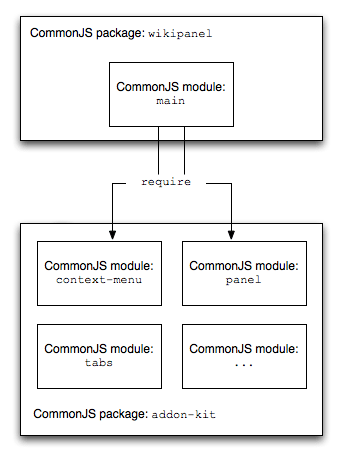CommonJS, Packages, and the SDK
CommonJS is the underlying infrastructure for both the SDK and the add-ons you build using the SDK.
The CommonJS group defines specifications for modules and packages.
CommonJS Modules
A CommonJS module is a piece of reusable JavaScript: it exports certain objects which are thus made available to dependent code. To facilitate this CommonJS defines:
-
an object called
exportswhich contains all the objects which a CommonJS module wants to make available to other modules -
a function called
requirewhich a module can use to import theexportsobject of another module.

The SDK
freezes
the exports object returned by require. So a if you import a module using
require, you can't change the properties of the object returned:
1 2 3 4 5 6 7 | self = require("self");// Attempting to define a new property// will fail, or throw an exception in strict modeself.foo = 1;// Attempting to modify an existing property// will fail, or throw an exception in strict modeself.data = "foo"; |
CommonJS Packages
A CommonJS package is a structure which can wrap a collection of related modules: this makes it easier to distribute, install and manage modules.
Minimally, a package must include a package descriptor file named
package.json: this file contains information about the package such as a short
description, the authors, and the other packages it depends on.
Packages must also follow a particular directory structure, which is the
structure cfx init created for your add-on.
CommonJS and the Add-on SDK

-
The JavaScript modules which the SDK provides are CommonJS modules, and they are collected into CommonJS packages.
-
The JavaScript components of an add-on constitute one or more CommonJS modules, and a complete add-on is a CommonJS package.
According to the CommonJS specification, if a module called main exists in a
CommonJS package, that module will be evaluated as soon as your program is
loaded. For an add-on, that means that the main module will be evaluated as
soon as Firefox has enabled the add-on.
Because an add-on is a CommonJS package it's possible to include more than one module in an add-on, and to make your modules available to any code that want to use them.
Packages in the SDK
Navigate to the root of your SDK installation and list the contents of the "packages" directory:
ls packages
You will see something like this:
addon-kit api-utils test-harness
So the modules which implement the SDK's APIs are
collected into three packages, addon-kit, api-utils and test-harness.
addon-kit
Modules in the addon-kit package implement high-level APIs for
building add-ons:
- creating user interfaces
- interacting with the web
- interacting with the browser
These modules are "supported": meaning that they are stable, and that we'll avoid making incompatible changes to them unless absolutely necessary.
They are documented in the "High-Level APIs" section of the sidebar.
api-utils
Modules in the api-utils package implement low-level APIs. These
modules fall roughly into three categories:
-
fundamental utilities such as collection and url. Many add-ons are likely to want to use modules from this category.
-
building blocks for higher level modules, such as event/core, event/target, heritage, and namespace. You're more likely to use these if you are building your own modules that implement new APIs, thus extending the SDK itself.
-
privileged modules that expose powerful low-level capabilities such as xhr and xpcom. You can use these modules in your add-on if you need to, but should be aware that the cost of privileged access is the need to take more elaborate security precautions. In many cases these modules have simpler, more restricted analogs in the high-level addon-kit package (for example, tabs or request).
These modules are still in active development, and we expect to make incompatible changes to them in future releases.
If you use these modules in your add-on you may need to rewrite your code when upgrading to a newer release of the SDK.They are documented in the "Low-Level APIs" section of the sidebar.
test-harness
Modules in this packages are used internally by the SDK's test code.
